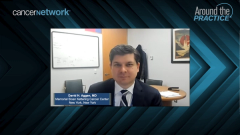
Patient Profile 1: Favorable-Risk RCC Treated With Lenvatinib + Pembrolizumab
Experts open their discussion on RCC by reviewing the clinical scenario of a patient with favorable-risk disease who is treated with the TKI/IO regimen of lenvatinib and pembrolizumab.
Episodes in this series

Transcript:
Robert J. Motzer, MD: Welcome to this CancerNetwork® Around the Practice program, “Evidence-based Strategies to Improve Outcomes in Advanced RCC.” I am your host, Dr Robert Motzer, kidney cancer section head and the Jack and Dorothy Byrne Chair in Clinical Oncology at Memorial Sloan Kettering Cancer Center in New York. I have a great panel of experts who have joined me today. I would like to invite my esteemed fellow panelists to introduce themselves.
David H. Aggen, MD: Hi, I’m Dr David Aggen and I’m a medical oncologist at Memorial Sloan Kettering Cancer Center in New York City.
Robert S. Alter, MD: Robert Alter, a genitourinary [GU] medical oncologist at the John Theurer Cancer Center in Hackensack, New Jersey.
Robert J. Motzer, MD: Dr Bilen?
Mehmet A. Bilen, MD: Hi everyone. I am Mehmet Asim Bilen, associate professor at Emory University [School of Medicine] and the director of GU medical oncology at the Winship Cancer Institute. I’m glad to be here today with my dear friends who are excellent GU oncologists around the country, thank you.
Brian I. Rini, MD: I’m Brian Rini, a GU medical oncologist at Vanderbilt-Ingram Cancer Center in Nashville, Tennessee.
Robert J. Motzer, MD: Welcome and thank you for joining me. Today we are going to discuss recent advances in the treatment of renal cell carcinoma [RCC] and their impact on clinical practice. We will present real-world patient cases and discuss the treatment strategy to illustrate how we incorporate recent data into practice for patients with renal cell carcinoma. Let’s get started with our first case. Dr Bilen?
Mehmet A. Bilen, MD: I’m going to go over quickly the first case. This is a 67-year-old male patient who initially underwent left laparoscopic radical nephrectomy and the pathology was clear cell RCC, Fuhrman grade 3. At that time, he didn’t have any evidence of metastatic disease. For this reason, he was observed for 5 years, and then recently in 2021, the follow-up scan show multiple new lung metastases and pancreatic metastases. One of the lesions was biopsied and turned out to be metastatic RCC. Due to multifocal disease, surgical resection is not feasible, and the patient is IMDC [International Metastatic RCC Database Consortium] favorable risk.
Shown here is some of the imaging; on the left side, we see multiple small lung metastases, both on the left and right lung. And on the right side of the screen, we see 2 pancreatic lesions, also suggestive of metastatic RCC. After a discussion with the patient, we started treatment with pembrolizumab and lenvatinib. Initially pembrolizumab was given at 200 mg q3 [every 3] weeks and subsequently switched to q6 [every 6] weeks. And then Lenvima [lenvatinib] was started at 20 mg PO [orally] daily. After 2 cycles, the patient developed hand-foot syndrome. Because of this, lenvatinib was dose-reduced, and urea cream was prescribed. Then after the adverse effect improved, the patient was able to tolerate it much better.
After 4 cycles of treatment, the patient’s liver enzymes increased initially to grade 2. Because of this, both of the treatments were held, and when the liver enzymes were checked in 3 days, they were increasing. For this reason, we felt this is immune-mediated hepatitis, so the patient was started on a high-dose steroid, which resulted in LFT [liver function test] normalization, and then a weekly steroid taper. The repeat scan shows complete response in both lung and pancreas metastases. At that time, a discussion was had with the patient in terms of either restarting lenvatinib alone or observation, and the patient decided to get every 3 month imaging and remain on active surveillance. After that the patient is doing well, the LFT is normal. He’s still on a treatment break, and there is no evidence of disease on repeat imaging.
Robert J. Motzer, MD: Thanks, Mehmet, for that great presentation of a patient with a favorable-risk RCC who has a complete response to pembrolizumab and lenvatinib, despite the fact that there was IO [immunotherapy]-related toxicity. Brian, you’ve played a pivotal role in development of basically all of the regimens in RCC, so can you briefly give us a sense or a review in terms of the TKI [tyrosine kinase inhibitor]/IO programs that are considered to be a standard option for a patient like this?
Brian I. Rini, MD: Sure. Thanks, Bob. I guess one thing I’d say is when I saw those first scans, one of my initial thoughts was, “Gee, maybe this is somebody we could observe, with real small volume lung disease.” Pancreatic metastases tend to be more indolent, endocrine organs in general. In terms of the IO/TKIs, and I will say patients with pancreatic metastases tend to be more angiogenesis responsive, so I think the choice of an IO/TKI makes biologic sense here. There are 4 such regimens approved: lenvatinib and pembrolizumab, which this patient got, axitinib and pembrolizumab, cabozantinib and nivolumab, and then axitinib and avelumab. The first 3 I mentioned have a survival benefit. They were developed in parallel, very similar trials, but not identical, and they all provide benefit to patients, they all provide a fairly equivalent survival benefit over sunitinib. They also provide response rates in the 55% to 70% range, and complete response [CR] in roughly the 10% to 15% range. It does look like lenvatinib and pembrolizumab has higher absolute numbers for PFS [progression-free survival], response rate, and CR rate. Whether it’s a truly better regimen or just differences in trials, I don’t think we know. To me it really comes down to a dealer’s choice and comfort level with the TKI and comfort with dosing, and holding lenvatinib at 20 mg; it can be a more difficult drug, as I think this patient experienced. But I usually say that there’s not 1 best choice here, it’s about finding a regimen you’re comfortable with and then administer it in practice and become an expert in that regimen.
Robert J. Motzer, MD: I think you made some really great points in terms of surveillance, which is definitely an option, particularly for favorable-risk patients, and many of our patients we opt for surveillance and hold off on drug therapy.
Transcript edited for clarity.
Newsletter
Stay up to date on recent advances in the multidisciplinary approach to cancer.











































